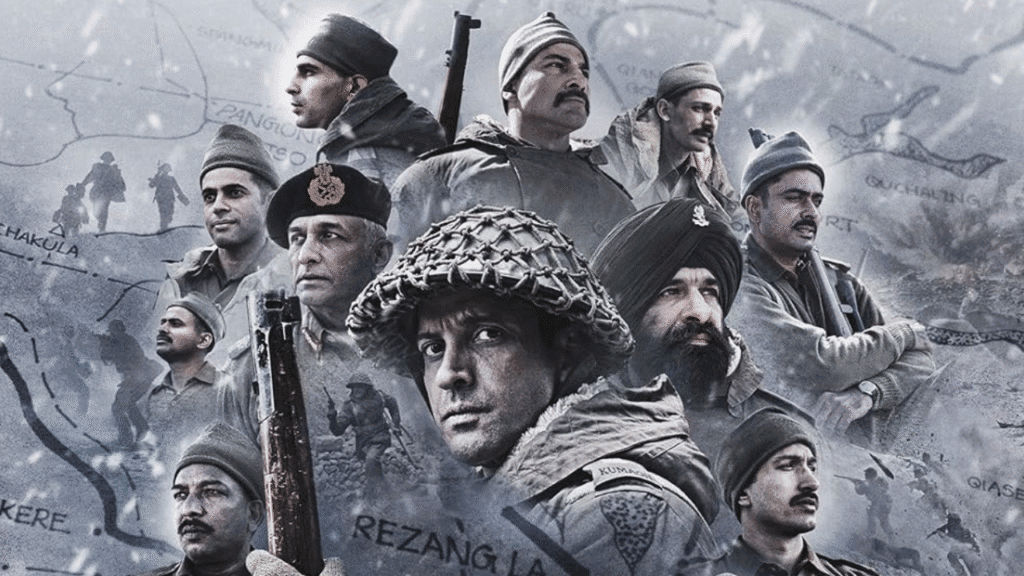120 Bahadur brings to life one of India’s most courageous last stands — the 1962 Battle of Rezang La. Under the direction of Razneesh “Razy” Ghai, the film traces the journey of Major Shaitan Singh Bhati (played by Farhan Akhtar) and the 120 men of Charlie Company, 13 Kumaon Regiment, as they defend their position in the brutal, towering heights of Ladakh against overwhelming odds. Interwoven with their military resolve are human stories: the brotherhood among soldiers, the doubts and fears of family waiting back home, and the unspoken moral weight of sacrifice. This is not just a war film about territory; it is a tribute to memory, honor, and the men whose names risk being forgotten.
What Critics Are Saying
Critics have greeted 120 Bahadur with respectful admiration for its intent and craft, even as many register frustration at uneven execution. India Today praises the youthful ensemble — names like Sparsh Walia, Ankit Siwach, Sahib Verma and Dhanveer Singh — for bringing immediacy and camaraderie to the frontline, though the review suggests Farhan Akhtar’s turn as Major Shaitan Singh sometimes lacks the raw intensity demanded by such a towering historical figure. The reviewer notes that several emotional beats feel engineered, but concedes the film’s visual design and the soldiers’ bond land with genuine effect.
Scroll.in captures the film’s tonal dilemma: it calls 120 Bahadur a “moist-eyed, heartfelt tribute” that nevertheless makes audiences wait for its emotional payoff. The piece highlights the patience of the first half and the fierce payoffs in the battle sequences, while warning that the build-up sometimes dilutes momentum.
Economic Times coverage and ET Online emphasize the film’s technical achievements: netizens and critics alike have praised its immersive visuals and the way Ladakh’s harshness is rendered on screen. That review also flags social reaction — viewers applauding the scale and authenticity even as they debate pacing and historical emphasis.
NDTV gives the film a watchable rating, appreciating the steady craftsmanship and consistent watchability. The review points out that the film’s staging and battle choreography create credible intensity, though it observes that the emotional arcs could have been deeper.
Koimoi takes a celebratory tone, arguing that the film’s chief service is to the unsung heroes — it urges viewers to honour bravery rather than judge performance choices, and frames the film as a necessary tribute that prioritises remembrance over critique.
By contrast, Firstpost offers a sharper critique: while commending the intention and certain technical sequences, it argues that Bollywood — and this film — owe the Indian Army and the memory of Major Shaitan Singh a more commanding cinematic portrayal. Firstpost finds the execution intermittently tentative, calling for greater narrative rigor in conveying the historical enormity.
News18 singles out Sparsh Walia as a scene-stealing presence and praises the ensemble’s capacity to humanize a historical episode. This review highlights how the film succeeds when it narrows its focus to soldierly bonds rather than dramatized spectacle.
Moneycontrol calls 120 Bahadur “one of Hindi cinema’s finer war stories,” arguing that its visual and auditory design restore Rezang La to public memory and do so with a technical confidence that many earlier attempts lacked.
Free Press Journal situates the film at a crossroads: while applauding Farhan Akhtar’s sincere attempt and the film’s reverence, it criticizes a slack in direction that sometimes tips the balance toward patriotic sentiment rather than critical reflection.
Finally, BollywoodLife offers a balanced read: it acknowledges Farhan Akhtar’s steady presence and applauds the production values and battle staging, but notes the film isn’t flawless — pacing issues and uneven emotional emphasis prevent it from being a complete triumph.
Taken together, these voices form a clear consensus: 120 Bahadur is an earnest, often powerful tribute that succeeds most when it foregrounds the soldiers themselves — their humor, fear, and resolve — while it falters when the film reaches for grander emotional or narrative gestures that feel slightly manufactured. The film’s technical mastery and its commitment to remembrance make it a meaningful cinematic attempt to recover Rezang La for contemporary audiences, even as debates about representation and execution continue.
Early audience reviews are equally layered. On Reddit, some viewers praise the realism, action, and emotional honesty, while others question casting choices and narrative structure. Comments reflect genuine admiration for the film’s intent: “a fresh take on the camaraderie of soldiers amid war,” one user writes. Another praises how the makers chose to hold paid preview screenings on the anniversary of the actual Battle of Rezang La — a nod to both history and remembrance.
Cinematic Craft & Technical Strengths
The film’s technical backbone is one of its greatest assets. Tetsuo Nagata, the cinematographer, brings haunting beauty to Ladakh’s snow-clad ridges, using wide frames to capture the scale of the conflict and the isolation of the soldiers’ post. The terrain becomes more than a backdrop — it is a silent character in the story, as lethal as any enemy.
Razneesh Ghai’s direction keeps the emotional tone grounded, resisting the urge to sensationalize every moment. His screenplay (written by Rajiv G. Menon) balances the necessity of action with moments of reflection — soldiers sharing simple meals, exchanging quiet jokes, confronting their own fears. Sumit Arora’s dialogue often feels earnest, bringing out the humanity of men who are much more than soldiers.
Musically, the film blends original songs by Amit Trivedi and Salim–Sulaiman with a haunting score by Satish Raghunathan. The result is a soundscape that amplifies sacrifice without overwhelming the narrative. The editing by Rameshwar S. Bhagat ensures that battle sequences breathe and that quieter, more intimate scenes have time to land emotionally.
Production design is another standout: recreating 1960s Ladakh, war-torn villages, snow-field encampments and battle lines all with an attention to detail that lends the film authenticity. The commitment to historical realism, combined with a cinematic vision, makes this film feel both epic and personal.
120 Bahadur: Cast & Key Contributors
At its core, 120 Bahadur is powered by a strong ensemble cast. Farhan Akhtar leads as Major Shaitan Singh Bhati, a figure of both leadership and sacrifice. Raashii Khanna plays his wife, adding emotional weight to his personal journey. Among the soldiers are Sparsh Walia, Ankit Siwach, Sahib Verma, Dhanveer Singh, Vivan Bhatena, Ajinkya Deo, and Eijaz Khan, each contributing to a collective portrait of camaraderie, courage, and grief.
Behind the camera, the film is helmed by Razneesh “Razy” Ghai, with Rajiv G. Menon as screenwriter and Sumit Arora writing the dialogue. Tetsuo Nagata’s cinematography, Rameshwar S. Bhagat’s editing, and musical contributions from Amit Trivedi, Salim–Sulaiman, and Satish Raghunathan round out the creative team. Produced by Farhan Akhtar, Ritesh Sidhwani, and Amit Chandrra under Excel Entertainment and Trigger Happy Studios, the film reflects a deeply collaborative effort aimed at honoring a pivotal moment in history.
Cultural Impact & Controversy
The film’s release comes amid growing cultural and legal debate. Several members of the Ahir community, part of the 13 Kumaon Regiment’s Charlie Company in 1962, have criticized the film for allegedly sidelining their role in the battle. Legal petitions and protests have called the title into question, demanding either a name change or clearer acknowledgment of the community’s specific contribution. The controversy raises fundamental questions about how war films represent collective sacrifice, identity, and memory.
Beyond the protests, 120 Bahadur is sparking national conversation about how India remembers its heroes. Viewed as both tribute and reckoning, the film underscores the difficult balance between personal stories and historical legacy — how films can shape public memory, and how communities demand recognition in return.
A Respectful Tribute That Hits Hard
120 Bahadur is not a perfect war epic — it stumbles at times, weighed by ambition and the enormity of its subject. Farhan Akhtar’s performance, though sincere, doesn’t always land with the intensity the real-life figure commands. Some emotional arcs feel familiar, some pacing feels cautious.
But where it succeeds, it truly soars. Its visuals are breathtaking, its tribute heartfelt, and its intention noble. It resurrects a chapter of history that many know only in textbooks, honoring soldiers who sacrificed everything. For viewers who value dignity over drama, memory over spectacle, 120 Bahadur is a powerful, deeply felt homage — a film that remembers, respects, and refuses to forget.
Read More Review Roundups

























